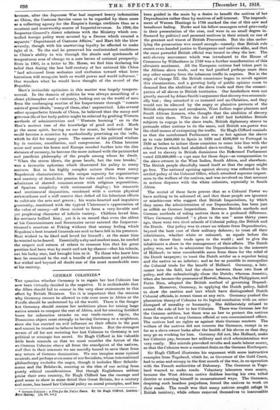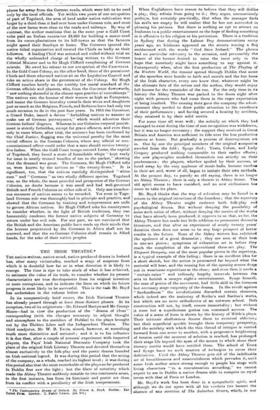GERMAN COLONIES.*
THE question whether Germany is to regain her lost Colonies has now been virtually decided in the negative. It is unthinkable that the Allies should fail to concur in the very clear statements to this effect by British Ministers. Yet it is important that the reasons why Germany cannot be allowed to rule once more in Africa or the Pacific should be understood by all the world. There is the danger lest Germany should resume her ambitious plans for raising large native armies to conquer the rest of Africa, and for creating fortified bases for submarine attacks on our trade-routes. Again, the Dominions object most strongly to having Germany as a neighbour, since she has exerted an evil influence on their affairs in the past and cannot be trusted to behave better in future. But the strongest season of all for not restoring her lost Colonies to Germany is not political or strategic but moral. Sir Hugh Clifford in his valuable little book reminds us that we must consider the future of the ex-German Colonies above all from the standpoint of the natives, and that in their interests we are morally bound to save them from any return of German domination. We can imagine some cynical neutrals, and perhaps even some of our Socialists, whose international philanthropy excludes the negro, though it includes Herr Scheide- mann and the Bolshevik, sneering at the idea of our acting from purely ethical considerations. But though Englishmen seldom praise their own country, Sir Hugh Clifford has the courage and good sense to show in some detail that Great Britain, for a century rind more, has based her Colonial policy on moral principles, and has • German colonies: a Plea for Ms Satire Ram. By Sir Hugh Clifford. London: JoLn Murray. [5. &I. seal
been guided in the main by a desire to benefit the natives of her Dependencies rather than by motives of self-interest. The impeach- ment of Warren Hastings in 1788 marked the rise of this new and beneficent feeling. Burke and his fellow-managers erred grievously in their presentation of the case, and were in no small degree in- fluenced by political and personal motives in their attack on one of the greatest and wisest of British Proconsuls. But the idea under- lying the prosecution was sound enough—namely, that British rule meant even-handed justice to Europeans and natives alike, and that the most powerful British official was bound to obey the law. The anti-slavery movement which was introduced to the House of Commons by Wilberforce in 1789 was a further manifestation of this altruistic sentiment. All the European nations had taken part in the African slave trade, and we had profited perhaps more than any other country from the infamous traffic in negroes. But in the reign of George III. the British conscience began to revolt against this abomination, and a growing body of public opinion came to demand first the abolition of the slave trade and then the emanci- pation of all slaves in British territories. Our forefathers were not greatly moved by Adam Smith's argument that slavery was economic-
ally bad ; they attacked it as immoral and un-Christian, and they
would not be silenced by the angry or plaintive protests of the British shipowners and merehants, West Indian sugar-planters and South African farmers, who thought that the abolition of slavery would ruin them. When the Act of 1807 had forbidden British subjects to engage in the slave trade, British diplomacy strove to persuade other nations to do the same, and British sea-power was the chief means of extirpating the traffic. Sir Hugh Clifford reminds us that the unreformed Parliament was so hot against the slaver as to vote 4400,000 to Spain in 1820 and 4300,000 to Portugal in
1.830 as bribes to induce those countries to come into line with the other Powers which had abolished slave-trading. In order to put
an end to slavery in British dominions the Reformed Parliament voted 420,000,000—a vast sum for those days—as compensation to the slave-owners in the West Indies, South Africa, and elsewhere.
The British people cheerfully taxed itself so that the negro might go free. The national uprising against slavery was reflected in the settled policy of the Colonial Office, which attached supreme import- ance to the welfare of the natives, and was involved on that account in serious disputes with the white colonists, especially in South Africa.
The recital of these facts proves that as a Colonial Power we have nothing to be ashamed of, and that those people are ignorant or mischievous who suggest that British Imperialism, by which they mean the administration of our Dependencies, has been just as selfish as German Imperialism. Between British methods and German methods of ruling natives there is a profound difference.
When Germany claimed "a place in the sun" some thirty years ago, there were two rival schools of Colonial policy, the British and the Dutch. Our policy was to exact no tribute from Dependencies, beyond the bare cost of their military defence ; to treat all their inhabitants, whether white or coloured, as equals before the law ; to throw their trade open to the world ; and to give the inhabitants a share in the management of their affairs. The Dutch policy was, and is, to administer the Dependencies in the interests
of Holland; to raise considerable sums from them for the relief of
the Dutch taxpayer; to treat the Dutch settler as a superior being and the native as an inferior; and as far as possible to monopolize the Colonial trade for the benefit of Holland. Germany, a late- comer into the field, had the choice between these two lines of policy, and she unhesitatingly chose the Dutch; whereas America, when she became the possessor of Hawaii, Samoa, the Philippines, and
Porto Rico, adopted the British method of governing Depend- encies. Moreover, Germany, in applying the Dutch policy, failed
to show the caution and tact which have distinguished Dutch Colonial officials, in recent times at any rate. Germany pushed the plantation theory of Colonies to its logical conclusion with an utter disregard of morality or humanity. She deliberately refused to extend the rule of law to her Colonies. There was German law for the German settlers, but there was no law to protect the natives from the caprice of any German official or non-commissioned officer.
The natives had no rights as against their German masters. The welfare of the natives did not concern the Germans, except in so far as a slave-owner looks after the health of his slaves so that they may go on working for him. Germany did not, like Holland, make her Colonies pay, because her military and civil administration was very costly. Her misrule provoked revolts and made labour scarce, so that the Colonies were a constant drain on the German Exchequer.
Sir Hugh Clifford illustrates his argument with some instructive examples from Togoland, which he, as Governor of the Gold Coast, had to seize and occupy in the first month of the war, in co-operation with the French authorities of Dahomey. The Germans in Togo. land wanted to make roads. Voluntary labourers were scarce, because the West African native dislikes leaving his own tribal district or exerting himself in unaccustomed ways. The Germans, despising such heathen prejudices, forced the natives to work on their roads. The result was that many natives sought refugo in British territory, while others removed themselves to inaccessible
places far away from the German roads, which were left to be used only by the local officials. Yet within two years of our occupation of part of Togoland, the area of land under native cultivation was larger by a third than it had ever been under German rule, and most of the new farms were Close to the roads and railways. By way of contrast, the author mentions that in the same year a Gold Coast tribe paid an Italian contraeter £8,003 for building a motor-road from its cocoa-plantations to its hill-towns so that the farmers might spend their Sundays at home. The Germane ignored the native tribal organization and treated the Chiefs as badly as their followers. A leading Chief was arrested and exiled without trial on the wholly unfounded charge of having written to the German Colonial Minister and to Sir Hugh Clifford complaining of German misrule. He owed his release to our o3oepation of the Cameroens. In the Gold Coast Colony, on the other hand, three of the prominent Chiefs and three educated natives sit on the Legislative Council and take an active share in the government of the Colony. Sir Hugh Clifford touches briefly on the terribly low moral standard of the German officials and planters, who, from the Governor downwards, "saw nothing shameful in the almost open practice co! coneubinage." The natives rate the honour of their women as high as Europeans, and resent the German brutality towards their wives and daughters just tuimuch as the Belgians, French, and Serbians have had only too much occasion to do in the past four years. In 1913 the Governor,
a Grand Duke, issued a decree "forbidding natives to assume or
make use of German patronymics," which would advertise their German fathers' disgrace. Whereas in our Colonies corporal punish- ment is strictly forbidden, except for grave offences, and even then only in cases where, after trial, the sentence has been confirmed by the Chief Justice, flogging was the universal penalty for the most trivial offence in the German Colonies, where any official or non- commissioned officer could order that a man should receive twenty- five lashes. When the Gold Coast troops entered Lome, the capital of Togoland, they found a store of formidable whips kept reedy for issue in neatly trussed bundles of ten to the packet," showing that the demand was great. The Germans, Sir Hugh Clifford tells us, were known by the natives as "the twenty-fivers." It is significant, too, that the natives carefully distinguished "white men" and " Germans " as two wholly different species. Togoland was, on the whole, the most peaceful and prosperous of the German Colonies, no doubt because it was small and had well-governed British and French Colonies on either side of it. Only one treacher- ous massacre of natives seems to be recorded. Yet even in Togo- land German rule was thoroughly bad in principle and practice, and showed that the Germans by training and temperament are unfit to govern African natives. Sir Hugh Clifford asks his countrymen to consider whether, in the light of British traditions, they can honourably condemn the former native subjects of Germany to return under her evil rule. For our part, we are convinced that the British and the American public have made up their minds that the horrors perpetrated by the Germans in Africa shall not be renewed, and that the ex-German Colonies shall remain in Allied hands, for the sake of their native peoples.







































 Previous page
Previous page